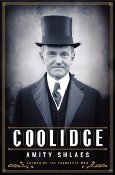
An Evening With Amity Shlaes
 Amity Shlaes is an engaging, vibrant and enthusiastic speaker who clearly loves her subject matter. On Monday night, Marcia and I had the distinct pleasure of listening to a presentation on Calvin Coolidge she gave at the Goldwater Institute.  Coolidge is the subject of her soon to be released new biography on this underappreciated president. In her words, she is on a “mission of reputation rebuilding.” She said that she figured that The Goldwater Institute was a better place than most to start, since the institute had done such a good job in restoring Barry Goldwater’s good name.
Amity Shlaes is an engaging, vibrant and enthusiastic speaker who clearly loves her subject matter. On Monday night, Marcia and I had the distinct pleasure of listening to a presentation on Calvin Coolidge she gave at the Goldwater Institute.  Coolidge is the subject of her soon to be released new biography on this underappreciated president. In her words, she is on a “mission of reputation rebuilding.” She said that she figured that The Goldwater Institute was a better place than most to start, since the institute had done such a good job in restoring Barry Goldwater’s good name.
Like Goldwater, Coolidge has been roundly castigated by the left, who’s agenda it is to convince successive generations of Americans that the roaring twenties were a time of awful decadence and led to the Great Depression, a depression that only the socialist policies of an FDR could correct.
The actual historical record says something entirely different, of course. The horrendous failure of those policies of the thirties caused the depression to last much longer than it otherwise would have. According to Shlaes, the only way to alleviate this awful truth is to convince people that the twenties were really terrible and that Coolidge was to blame for the onslaught of everything from the Dustbowl to the collapse of Wall Street.
When Coolidge took office after the untimely demise of President Harding, few knew what to expect from this silent , slightly dour individual. He never gained much popularity within the social elites of Washington. Alice Roosevelt Longworth, the eldest child of Theodore Roosevelt, famously remarked of Calvin Coolidge that he was so sour-looking that he was apparently “weaned on a pickle.â€
Coolidge stoically bore the criticisms of the Washington crowd and continually frustrated their efforts to grow government, regardless of how they attacked him.
Mr Coolidge’s genius for inactivity is developed to a very high point. It is far from being an indolent activity…Nobody has ever worked harder at inactivity, such force of character, with such unremitting attention to detail…Mr Coolidge’s inactivity…is a steady application to the task of neutralizing and thwarting political activity wherever there are signs of life. Walter Lippman
There is a story that Coolidge was approached at social function by a chirpy Washington socialite who told him, “That man over there bet me I couldn’t get two words out of you.” To which Coolidge replied, “You lose.”
Ms. Shlaes’s remarks were packed full of delightful quotes and anecdotes like these. This audience member can hardly wait to dive into her new book! Like nothing else, she paints a picture of the man’s character and personality.
Equally as interesting as the character sketch provided by Shlaes, was her discourse on the emphasis that Coolidge put on reducing tax rates and cutting government budgets. While Coolidge was in office, unemployment remained less than 5%, the top tax rate was reduced from over 70% to 25%, the budget was balanced every year, and government spending was less when he left office than when he assumed it.
Coolidge was a hugely popular president, if not with the Washington bureaucracy, with the American people as a whole. To paraphrase Shlaes, he proved that one could be square and still be respected and appreciated.
Shlaes characterized Coolidge as a straight shooter who rarely had anything bad to say about anyone. Instead he evinced natural humility, deep faith, and a commitment to service. He believed that the job of the president was more important than the man who held the office.
 According to Shlaes, Coolidge was a master strategist who turned the use of the pocket veto into an art form, and subsequently the Supreme Court ruled that it was a legitimate exercise of executive power. A pocket veto cannot be overridden, instead the whole bill must be redone. Shlaes refers to Coolidge as “the story of a president who said no.”
According to Shlaes, Coolidge was a master strategist who turned the use of the pocket veto into an art form, and subsequently the Supreme Court ruled that it was a legitimate exercise of executive power. A pocket veto cannot be overridden, instead the whole bill must be redone. Shlaes refers to Coolidge as “the story of a president who said no.”
This provides a nice contrast to her opening remark in which she accurately pointed out that for today’s politicians “it’s always a choice between yes and yes, when it comes to government spending.”
We could use another Calvin Coolidge.
 The posts are coming!
The posts are coming!
2 comments
I am really looking forward to the release of Amity Shlaes’ new book on Coolidge. Her last book, The Forgotten Man, about the Great Depression and the New Deal, is one of my favorite books over the last 10, no, 20 years. She’s a very engaging and insightful writer/historian. Really disappointed I could not attend her Goldwater appearance.
[Reply]
Coolidge and Goldwater would appear to have quite a few things in common, despite the also obvious differences. I commend Amity Shlaes on her effort to rehabilitate the sullied reputation of Calvin Coolidge. The writing of history is always a power play, and so far, the liberals had that field to themselves. Time for change!
[Reply]
Leave a Comment